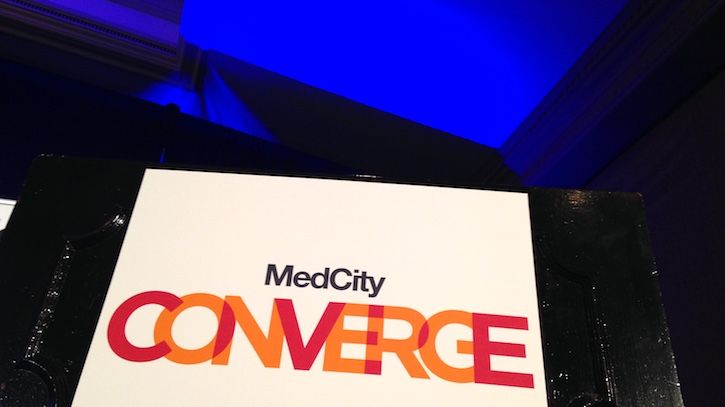Upstarts Get a Stage at MedCity CONVERGE
The firms utilized everything from novel devices to advanced analytics to dogs.

At this week’s lively MedCity CONVERGE meeting in Philadelphia, several recent and fast-growing companies in the cancer tech space were given the stage to flaunt their progress. The firms utilized everything from novel devices to advanced analytics to dogs.
Four-Legged Testing
Referring to the pharmaceutical development process as “The most broken industrial process in the world,” Christina Lopes explained the novel company she co-founded, The One Health Company. The high failure rate of developmental drugs, the company believes, contributes to the astronomical prices of development. Their efforts to help that situation come from an unexpected place.
“We’re really serious about better health for all, and we mean that cross-species, two-legged and four-legged friends alike,” she said.
“We’re the only company that leverages already-sick dogs, pet dogs that you have in your home…and enrolls them into pharma R&D trials,” she said, explaining the approach that she herself described as somewhat “radical.” There are 6 million dogs diagnosed with cancer, and they do not have options. Given that humans and domesticated dogs co-evolved together, leading to increased (if imperfect) genetic similarities between the two: in the least, dogs represent a better analogue than mice.
The company has recruited dozens of opinion leaders, garnered press, and assembled the world’s largest veterinary trial site network. The Philadelphia-based company is still quite new, but claims that so far it has a high rate of signups from owners of sick pets made aware of the opportunity, and that it has been able to attain 98% of the medical records on enrolled dogs.
RNA Over DNA?
Also novel, but perhaps less eyebrow-raising, was the work of Cofactor Genomics.
“While everybody has been very focused on DNA as a diagnostic, we identified very early on that RNA is a very powerful molecule because of its dynamic nature,” said Jarret Glassrock, PhD, the co-founder and CEO of Cofactor.
“Our entire team has gotten behind a mission, and is passion about becoming world leaders in interpreting RNA, and in doing so bringing a new class of drugs to market that will drive improvements in health and precision medicine.” The company, founded by Glassrock and colleagues from the Human Genome Project, works with pharma companies to develop RNA analysis techniques. In June, they raised over $10 million in Series A funding.
Glassrock also acknowledges that the work is early, but that their work with RNA in cancer is “enabling us to provide an accurate and complete tumor profiling guide to guide treatment decisions. Rather than using DNA as a proxy, we can actually identify over-expression of genes and gene-fusions.”
Remote Breast Cancer Scans
In the more immediately practical realm, Matthew Campisi spoke of a company he cofounded and serves as the Chief Technology Officer of: UE LifeSciences Inc.
A stern majority of breast cancer deaths occur in the developing world, Campisi said, and he pointed to a disparity in access to screening as one of the major culprits.
“There simply aren’t enough doctors in the developing world to handle the number of patients,” he said: whereas in the United States there is 1 radiologist for 10,000 women, there’s only 1 per 100,000 in India. In the developing world, studies have found breast cancer occurring in younger and younger women, raising concern about the use of radiology for screening. The cost of the process is also often prohibitively high for those in the developing world.

Hoping to remedy that a bit, UE LifeSciences created something Campisi called “quite disruptive.” Their iBreastExam (pictured), a handheld, battery-powered, device-linked imaging object that uses piezoelectric tactile sensors to determine changes in tissue stiffness in the breast. Painless and radiation-free, it allows health workers with relatively limited training to perform early, instantaneous breast exams in remote areas. In a study released in late 2016 the device displayed a sensitivity of 86 % and specificity of 89%. It’s been FDA-cleared in the US and is currently in use in the field in India.
“If you asked me how many employees I had last year, I would say 5. Now we’re at 50-plus, spread out through 3 offices around the world,” he said. The company has a long list of investors an partners, including the Commonwealth of Pennsylvania and various NGOs, that Campisi said have helped them to “get our wingspan wide enough to access as many people as possible.” He says they are looking to expand use of the device into Central, South, and even North America soon.
Podcast: Match Made in Hospitals — Patient-Matching Technology Can Improve Healthcare
September 21st 2021Clay Ritchey, CEO of Verato, highlights the administrative and financial benefits that patient-matching technology can provide hospitals and health systems, as well as how it can improve the patient experience.
Podcast: Using Digital Solutions to Address Technology Shortfalls with Citius Tech Senior VPs
July 29th 2021In an interview recorded earlier this year, Chief Healthcare Executive Associate Editorial Director Mary Caffrey spoke with 2 leaders of Citius Tech about meeting healthcare challenges with digital solutions.